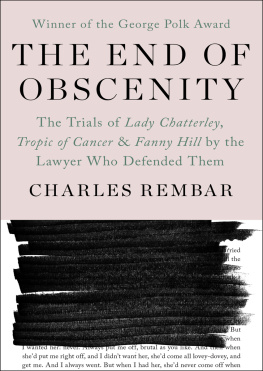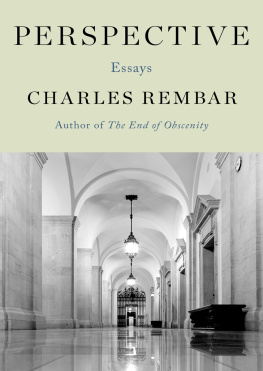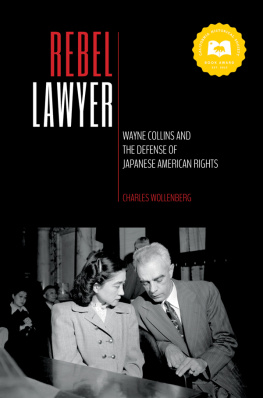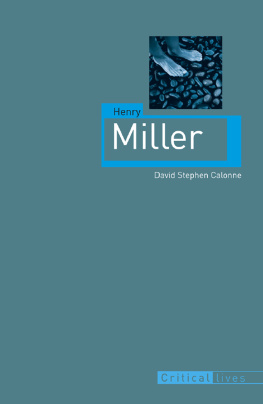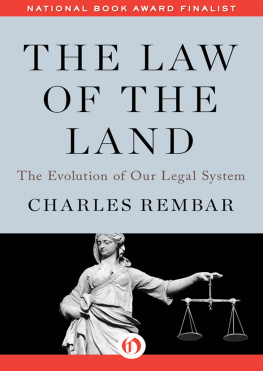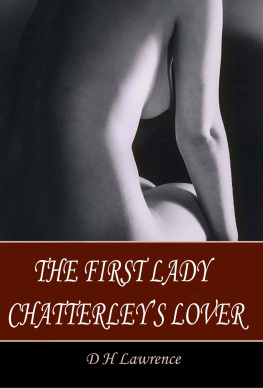The End of Obscenity
The Trials of Lady Chatterley, Tropic of Cancer & Fanny Hill by the Lawyer Who Defended Them
Charles Rembar

PRAISE FOR THE WRITING OF CHARLES REMBAR
The End of Obscenity
Winner of the George Polk Memorial Award in Journalism
The book in your hand is a quiet and essentially modest account of a legal revolution. Norman Mailer
A downright delight, a tour de force to fascinate lawyers and laymen alike. The New York Times Book Review
Erudition and wit, moral conviction and literary style Mr. Rembar is as much social critic and intellectual advocate as lawyer. The National Observer
[Rembars] book deals not with the why of obscenity laws but with the how, and as a result often has a freshness that little recent writing on this subject can match. The story of his oral argument before the Supreme Court in the Fanny Hill case is especially dramatic and enlightening, and many of his anecdotal digressions into history and law are sharp and amusing. The New Republic
A lively volume and often witty Fun withal and instructive. Commentary
[Rembar] talked our courts, state and federal, into capsizing more than a century of court-blessed censorship. The New York Times
The Law of the Land
A learned, thoughtful, witty legal history for the layman. The author, an American attorney, takes us back to Britain before the Norman conquests and brings us forward to the present. The New Yorker
A book that should fascinate both lawyers and those who throw up their hands at them. The Wall Street Journal
The origin and use of such features of our Anglo-American legal system as juries, evidence, and witnesses are studied here in their historical context. Rembar demonstrates wit and erudition as he reviews the political and social life that molded important legal matters. Library Journal
The style, analysis, and commentaryquite properlytake advantage of developments in the phraseology which had not occurred at the time of the events under discussion. The legal profession interested in this subject will find the work deserving attention. National Review
[The Law of the Lands] pages are vintage Rembar: witty, irreverent, intelligent, anecdotal, and very readable. The asides and vignettes are marvelous. The New York Times
Perspective
Rembar writes like a dream. And his feeling for the sanctity of the Supreme Court is stirring. The Boston Globe
To Billie Ann
Contents
Authors Note
The excerpts of trials and arguments that appear in this book have had no editing apart from punctuationcourt stenographers are excellent at catching sounds, but they are not so good on rests, and no witness says commathe correction of an occasional word where there was an obvious mistake in stenography or transcription, and, at a few points only, the use of italics where vocal stress was especially important to the meaning. Books dealing with the law sometimes indulge in revision of what was said in court, not to change the substance, but because extemporaneous speech, put on paper, tends to read poorly and is often downright embarrassing. The indulgence damages accuracy and deadens flavor. Accordingly, apart from the small efforts to make reproduction more exact, I have used the official court reporters transcript of their notes, without any attempt to spare the literary sensitivities of the reader or the ego of the speaker.
The description of the affairs of clients, and conversations with them, is in each instance with the clients permission.
Preface
Since the time when this book was first publishedsince indeed two years before, in 1966, when the cases that form its skeleton were donethe legal concepts that dominate the field have not changed at all. There is nothing to bring up to date.
In 1973 the Supreme Court issued a cluster of decisions that attracted wide attention. They were thought to change the legal standard by which obscenity is judged. That is, they were thought to do this by almost everyone who read themperhaps too quicklyand apparently also by the author of the principal opinions, Chief Justice Warren Burger. They created great alarm among libertarians.
There was no cause for alarm, an emotion easily suffered by those on either side of this persistent issue. If changing the law was Burgers goal, as the tenor of his opinion indicates, he missed.
The Chief Justice was writing against a background of constitutional interpretation developed in a series of cases culminating in the Fanny Hill decision. The constitutional development was this: the presence of obscenity would henceforth be determinedor, more precisely, expression could be held unlawful under anti-obscenity statutesonly on the basis of three tests. These were: (1) appeal predominantly prurient, (2) patent offensiveness, and (3) social value. To be condemned, a book had to fail all three. It had to possess the first two and be lacking in the third. Otherwise, the First Amendment would bar suppression.
Burger, speaking for a majority of the Court in his 1973 opinions, stated that prurient appeal and patent offensiveness were to be decided by local, not national, standards, and that the value formula should be changed from utterly without value to an absence of serious value. People devoted to freedom of expression expressed dismay; they felt that the liberal Fanny Hill criteria had been abandoned, and a new, more limited reading of the First Amendment imposed. I thought they were wrong, and wrote that they were wrong.
So far as prurient interest and patent offensiveness go, the national-local distinction, plausible in an appellate opinion, loses meaning in a trial court. (Even apart from the vagueness of local: state, county, city, town, the block you live on?) The distinction can hardly affect the verdict. When a jury is called upon to decide such questions, the result is almost surely a product of personal notions of what is prurient and what is offensive, without regard to geography. The judges charge makes little difference to the jurors; the operative standards are in their own heads.
As to the value test, utterly without seemed from the start to be an overstatement. Near the end of this book, in a comment on the effect of the cases recounted, the following appears:
Can a speck of value immunize a work? I think the answer is no. Though Brennan did not find occasion to say so, there will still, I believe, have to be a discernible, demonstrable value. And it will have to be a value that pervades the work.
That is to say, I felt the statement of the test could not be taken literallythat what was meant was not the utter absence of any value, but the presence of what Burger was later to call serious value. So here, on the most important tine of the triple test, there was not even conceptual change in the 1973 decisions.
This analysis was confirmed by subsequent events. The gloss on the law that Burger added had no practical effect. There were neither more prosecutions for obscenity nor more success for the prosecutors after 1973 than there had been between that year and 1966.
We may pause for a moment on two jurisprudential words: holding and dictum. A holding is the final result of a case in light of its facts and the legal issues presented, together with the line of
Next page
